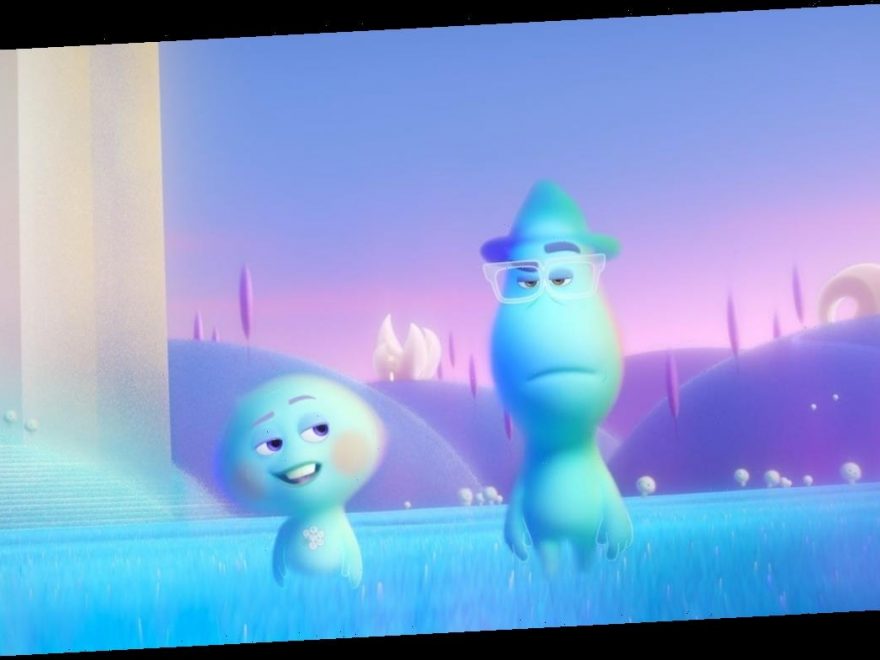In case you haven’t spent enough time this year pondering the meaning of life, Pixar is here to ask the big questions, but not without offering a bit of wisdom, too.
Soul centers on Joe Gardner (voiced by Jamie Foxx), a middle-aged middle school band teacher who believes his true purpose is to play jazz music. After inadvertently falling down an open manhole and winding up in The Great Before, Joe becomes an unwitting mentor to 22 (Tina Fey), a new soul still searching for her own “spark.”
Major spoilers ahead for “Soul.”
Mistaking a passion for being alive with having a specific purpose, Joe comes to something of an existential epiphany: Life is not about having some preordained purpose but choosing to live each day purposefully.
“I feel like there’s so many days — maybe before March — when I would wake up and I’d be like, ‘What do I have to do before lunch?’ And then, ‘What do I have to do before dinner?’ You just march through your day, and then it’s done,'” says director Pete Docter. “That’s a sad way to live. The idea that you’re waking yourself up to life and looking at it anew every day, I think is really exciting.”
With Soul now streaming on Disney+, Docter, co-director Kemp Powers and producer Dana Murray sit down with ET to discuss Soul‘s alternate endings, the gags that didn’t make it into the movie and that “head scratcher” of a post-credits scene.
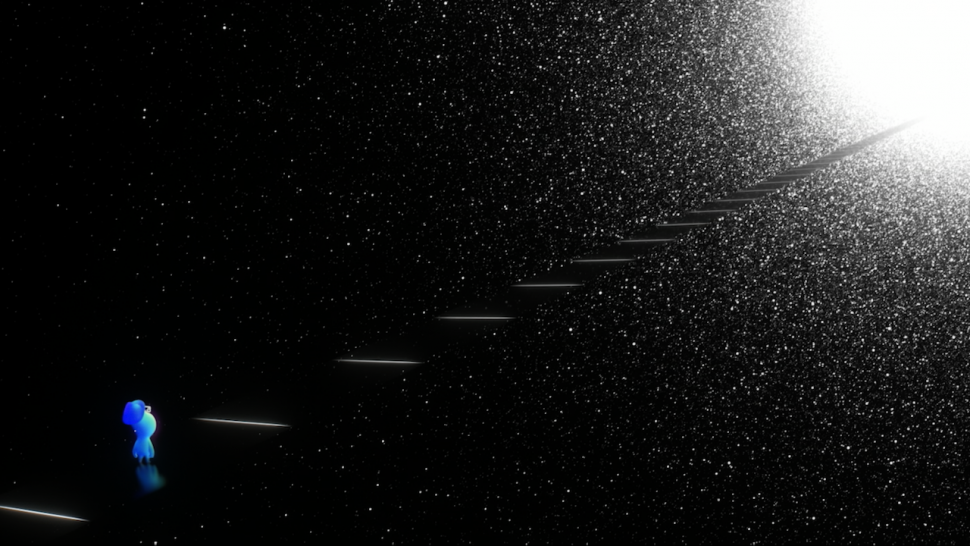
ET: I want to start at the end. This movie began with such large, existential questions, so how difficult was this ending to come to?
Dana Murray: Very. We went back and forth on the ending up until the last screening. For a long time, Joe did go to The Great Beyond. There was a lot of debating back and forth, but I think the more we saw him live his life and just thinking about his mother, Libba, and all these different factors, it felt like the right ending, that he needed to be able to go enjoy his life in the way he wanted to, because he’d learned so much throughout the film.
Kemp Powers: We have versions of the ending where Joe does not go back to his body, where he actually stays dead. We have versions of the ending where you see Joe on Earth a year later. Man, that ending sparked more debate than I think any other element of the film.
Were there people that were passionately on the side of sending him into The Great Beyond?
Pete Docter: Oh yeah, there were definitely camps. Because I think people felt like it’s cheating to let him go back. On the other hand, story-wise, you can’t teach this guy to enjoy life the right way and then rob him of that. So, it just didn’t seem like the right way to go. Although that was the original draft. At the time, I was thinking, “The most selfless act you could do is to pass on — I’ve had the chance. I’ve already enjoyed life. Now, you should have that chance, you, 22, who has not dared go down.” That seemed poetic and nice, but ultimately, in the movie, every scene was Joe going, “Wait a second, I didn’t live this the right way before.” So, it didn’t seem right then at the end to go, “All right, off you go!” [Laughs]
Did that original draft then end dissolving into The Great Beyond? Or had you thought about what could be beyond The Great Beyond? How deep did we go?
Docter: That version he was, like, at peace and went in. But there was another version where he actually went to The Great Beyond, there was a scene there and then he returned. And we realized we were probably playing with fire, even though it was pretty esoteric. I don’t think it was too explicit in terms of, “This is what the afterlife looks like!” It was more abstract. But still, we decided, “Eh, probably dangerous.” And not ultimately right for the film, most importantly.
Powers: The version with Joe not going back to his body, he basically ended up as a mentor in the You Seminar, but a repeat mentor. He stayed and ended up being, like, the best mentor ever, and he introduced lots of new ideas to the You Seminar. He kind of revolutionized it. It was very cute and very funny and it pissed some people off, but you know, you learn through trying. It didn’t work, but it was a fun exploration.
Murray: A lot of people had wanted to see where 22 ended up and so we boarded a scene that showed just a moment of her and where she was in her life. And then ultimately that didn’t feel as emotional in the ending, as well.
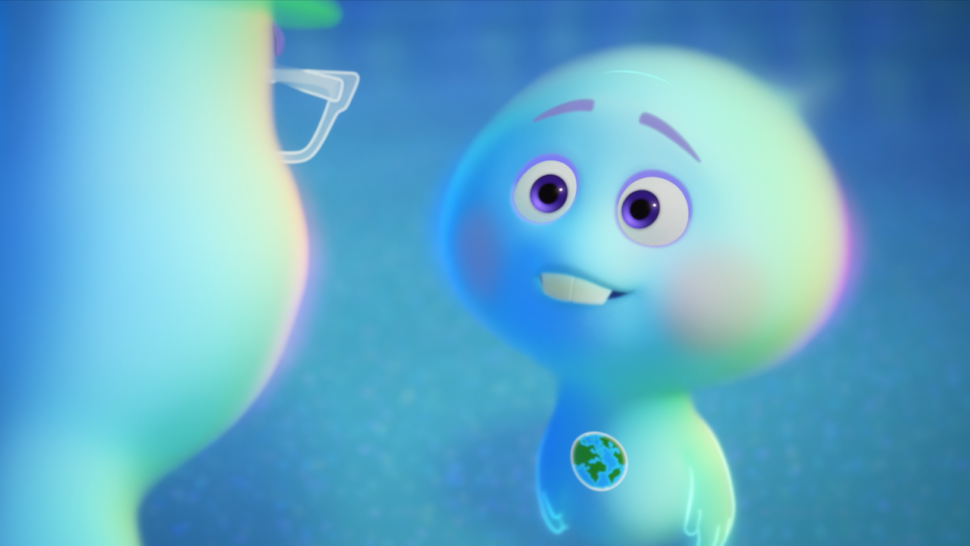
I was going to ask about that, if there was talk of including either 22’s birth or showing her life on Earth? At one point, I thought maybe we were going to jump into the future and show Joe meeting a little 22.
Docter: Oh, you saw that cut, did you? [Laughs] It was kind of like that!
Tell me about the scene you boarded. Where did you get down the road on that before deciding it ultimately wasn’t right for this?
Docter: We did a couple of ’em, but the one that I was thinking of was that Joe is a teacher and he hears a knock at the door and there’s a kid who’s like, “I really don’t like piano.” The mom’s like, “Come on, Mr. Garner is going to teach you,” and she does these little things that Joe’s like, “Wait a second. I know who that is…” And yet, somehow it wasn’t satisfying. It just wasn’t satisfying. We had a couple of other ones too.
Murray: We talked about so many different ideas, but it felt weird that she would end up in New York. Like, there’s the entire world and they both end up there. So, I think we had one version that she was in India and you see her in a moment as a baby and you could tell it’s her.
Docter: It would have been really tricky to land that 100% for the audience. This fuzzy blob with buckteeth, and then, oh, that human is clearly 22? We could probably do it, but ultimately, it wasn’t satisfying anyway. To me — and I guess I’m a fan of this even going back to Monsters Inc. — it’s much more powerful to give the decision to the audience. I know sometimes people are frustrated by that, but if you can plant something that allows an image to grow in their own head, they’re going to be an active participant in this. And whatever they come up with is going to be more real in a way and more emotional than anything we give them.
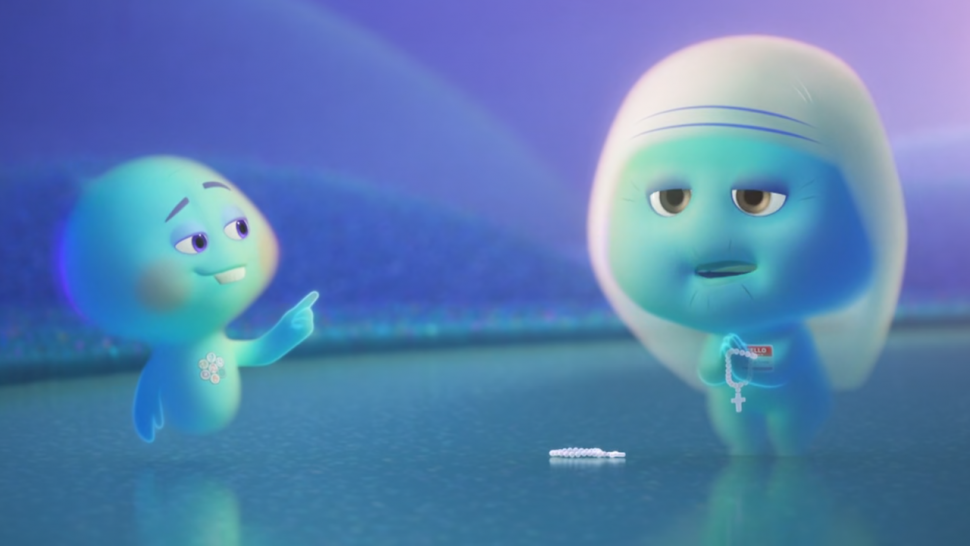
Going back to The Great Before, that’s where we get many of the great cutaway gags of 22 meeting Abraham Lincoln and Mother Teresa. Who were some of the historical figures you got close to including?
Powers: Rasputin. There’s a line in the film where Terry is like, “Jerry, the count’s off,” and she’s like, “The count hasn’t been off in centuries.” That was initially meant to be a reference to the last time the count was off, which was Rasputin, who you remember couldn’t be killed. It was both a bit too dark, I guess, and a joke that a lot of people didn’t get. And I worked hard to get the accidental Rasputin mentor into the film! But it just didn’t quite work out.
Murray: It was really hard, because no matter who we picked, someone would bring some piece of history about that person and be like, “You can’t say this person is…” And we’re like, “Oh, but it’s funny!” And we wanted to make sure we were being diverse with our gender and race, so it was tricky to pick them all.
What do you suppose happens to Dr. Börgensson after Joe takes his nametag? What’s his spin-off, or is it straight to The Great Beyond?
Docter: We had some gags that in there where he was wandering around still going, “Am I supposed to be here? What’s going on?” Like, he got lost and his name tag’s gone. Actually, we had a version that one of our story artists boarded where Börgensson was looking around, lost, accidentally got pushed over the edge and ended up in the soul of the cat at the end and became a therapy cat, because he was a therapist before. Anyway. It didn’t work, but we try a lot of stuff! It’s not for lack of trying.
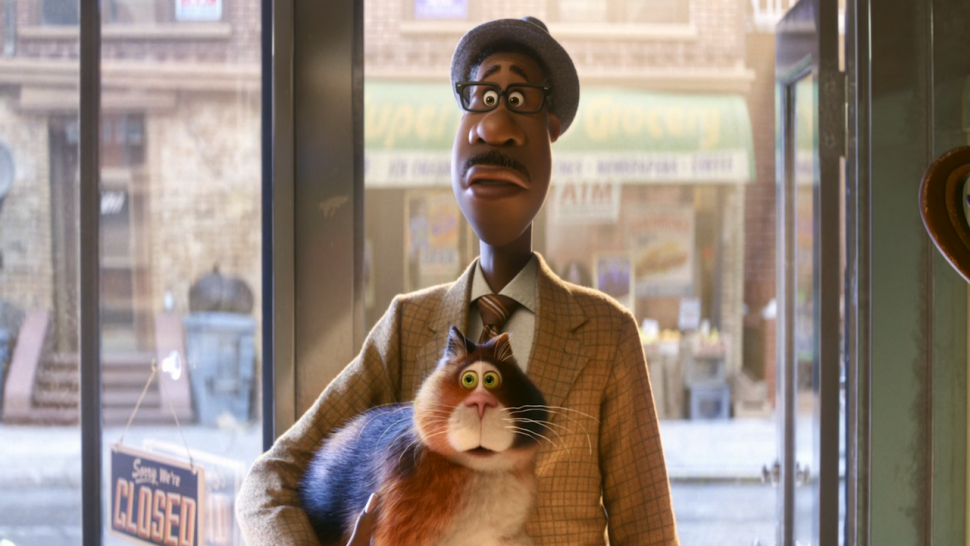
I need to know the brainstorming sessions and conversations that prompted the introduction of Mr. Mittens and the twist that Joe would wind up in a cat’s body back on Earth.
Docter: That was largely Mike Jones, who’s the first writer we worked with before Kemp came on. I don’t know the name of that cat with the splotches on it, but Mike actually had one. And somebody pointed out in one of the reviews, like, “In a rare lapse of research, only female cats have that spot patterning.” But apparently Mike’s actually had it! [Laughs] We were looking for some way for Joe to be able to look at his own life from a different perspective. We couldn’t give him everything he wanted, because the movie’s over if he gets back, so this was a way for Joe to walk through all the spaces, meet all the people and deal with things that he was trying to deal with as a human but see it from a different perspective and appreciate it then.
Powers: We had long discussions about the fact that it’s great from a comic perspective — the kids are going to get a real kick out of this — but Joe being stuck in the cat has to serve a purpose, and the purpose is for him to be able to see his life from a slightly different perspective. And it wasn’t quite working until we landed on this idea of when 22 is in his body, she’s not just seeing through his eyes — she’s accessing his memories as well. That was really what broke it wide open, because you see how that plays out in the moment in the third act where he sits at the piano and plays and is suddenly hit with experiencing his life through 22’s eyes. That’s when he has his bit of an epiphany, and that wasn’t initially in there. That was what really made it integral to the story, because ultimately, no one wanted to just make a whole film about a guy getting stuck in a cat.
You are making Pixar history with the studio’s first Black lead. Was there any concern about then having him spend a large part of the movie in soul form or in a cat or voiced by a white woman?
Murray: Oh, yeah. Years. And that’s why we spent time really building up a culture trust internally within the company and also brought on a lot of consultants externally and talked about these very tropes and had the hard conversations. I would say it was probably discussed almost every day for four years of how to do it right and not be disrespectful.
Docter: Yeah, very tricky.
Powers: You want to make sure that you’re not just doing it for the sake of gags. It has to have a purpose in terms of the greater story and the lessons that you’re trying to give and the story that you’re trying to tell. We couldn’t do the lowest common denominator version of this. For example, even when Joe is out of his body, he still has control over it when he’s back on Earth. He’s right there on her shoulder. You’re still seeing Joe. The soul element of it, it’s literally a film called Soul. The central thesis of the film is that every single one of us has a soul and you see hundreds of them. You see people in their soul forms, not just Joe, but people of all races. There’s a story we’re trying to tell and as long as you adhere to that story, I think, of course, it’s potentially problematic, but it’s potentially problematic because of the history of animation and how Black people are treated, and we purposely made sure that we treated these characters with different level of respect.
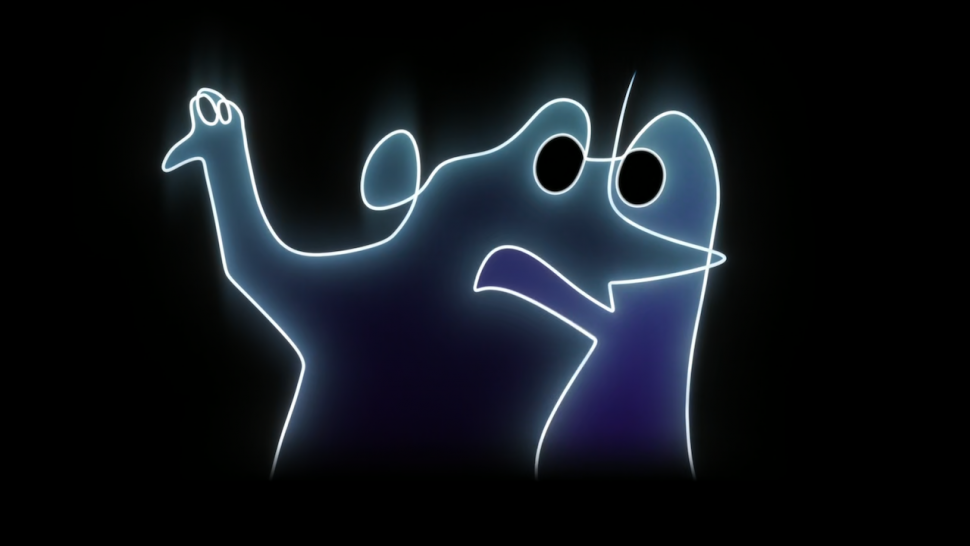
In the credits, you pay thanks to the likes of Amy Poehler, Rashida Jones, Nick Kroll, John Mulaney and Bill Hader, among many others. How did they contribute to Soul?
Powers: It’s a Pixar family. There’s a lot of people that you reach out to from previous films just to spitball ideas, to shoot the sh*t. I never met Bill Hader, but I know that he’s a very, very popular guy in the halls of Pixar. He’s been in a lot of Pixar films. I remember having dinner once with Amy and Tina. There are actual consultants and then there’s just lots of friends of Pixar who Pete or Dana or the filmmakers might get on the phone with at any given time and talk about something. Now, I’m in the Pixar family. The experience of making one of these films is really, really unique, and once you’ve done one, you are in that club.
If you stay through the very, very end of the credits, Terry (Rachel House) pops up and shouts, “Oye, movie’s over. Go home!” Obviously, you couldn’t have planned it but now that the movie is premiering on Disney+ and we’re watching at home, did you consider tweaking that gag?
Murray: I think it was kind of funny to just leave it, because we were like, “It is what it is!” [Laughs] Pete, did you ever want to change it?
Docter: I did think about it. I grew up loving The Muppet Movie and at the very end, Animal pops up and says, “Go home! Go home!” and I always thought it was hilarious. But it did confuse me, because I watched The Muppet Movie at home and I was like, “I’m already at home…” So, this will be a new head scratcher for generations of kids!
Source: Read Full Article
